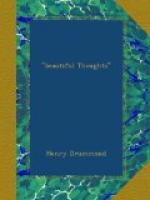November 30th. Think of it, the past is not only focussed there, in a man’s soul, it is there. How could it be reflected from there if it were not there? All things that he has ever seen, known, felt, believed of the surrounding world are now within him, have become part of him, in part are him—he has been changed into their image. He may deny it, he may resent it, but they are there. They do not adhere to him, they are transfused through him. He cannot alter or rub them out. They are not in his memory, they are in him. His soul is as they have filled it, made it, left it. The Changed Life, p. 27.
December 1st. Temper is significant, not in what it is alone but in what it reveals. . . . It is a test for love, a symptom, a revelation of an unloving nature at bottom. It is the intermittent fever which bespeaks unintermittent disease within; the occasional bubble escaping to the surface which betrays some rottenness underneath; a sample of the most hidden products of the soul dropped involuntarily when off one’s guard; in A word, the lightning form of a hundred hideous and un-Christian sins. The Greatest Thing in the World, p. 34.
December 2d. You will find, as you look back upon your life, that the moments that stand out, the moments when you have really lived, are the moments when you have done things in a spirit of love. As memory scans the past, above and beyond all the transitory pleasures of life there leap forward those supreme hours when you have been enabled to do unnoticed kindnesses to those round about you, things too trifling to speak about, but which you feel have entered into your eternal life. The Greatest Thing in the World, p. 60.
December 3d. If events change men, much more persons. No man can meet another on the street without making some mark upon him. We say we exchange words when we meet; what we exchange is souls. And when intercourse is very close and very frequent, so complete is this exchange that recognizable bits of the one soul begin to show in the other’s nature, and the second is conscious of a similar and growing debt to the first. The Changed Life, p. 30.
December 4th. In the natural world we absorb heat, breathe air, draw on Environment all but automatically for meat and drink, for the nourishment of the senses, for mental stimulus, for all that, penetrating us from without, can prolong, enrich, and elevate life. But in the spiritual world we have all this to learn. We are new creatures, and even the bare living has to be acquired. Natural Law, p. 267.
December 5th. The great point in learning to live the spiritual life is to live naturally. As closely as possible we must follow the broad, clear lines of the natural life. And there are three things especially which it is necessary for us to keep continually in view. The first is that the organism contains within itself only one-half of what is essential to life; the second is that the other half is contained in the Environment; the third, that the condition of receptivity is simple union between the organism and the Environment. Natural Law, p. 268.




